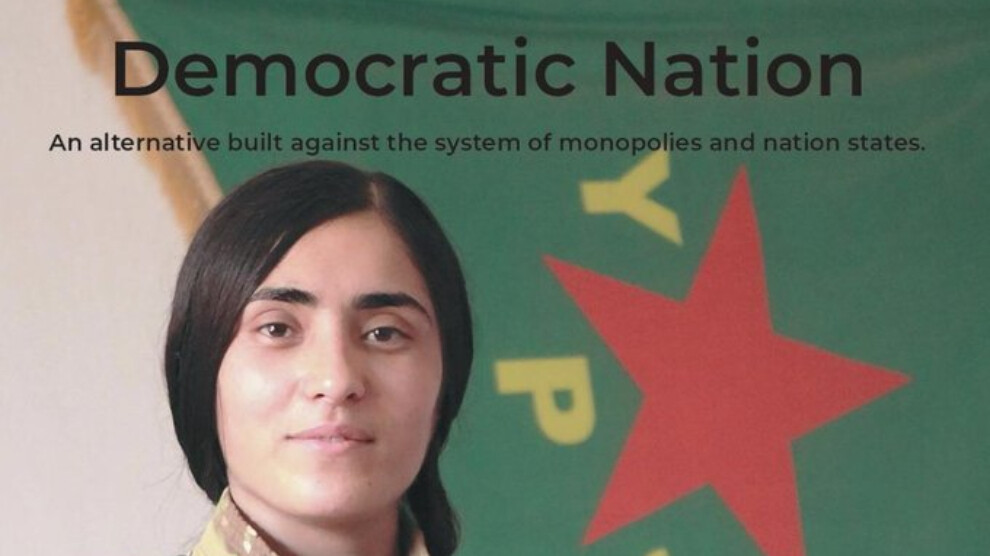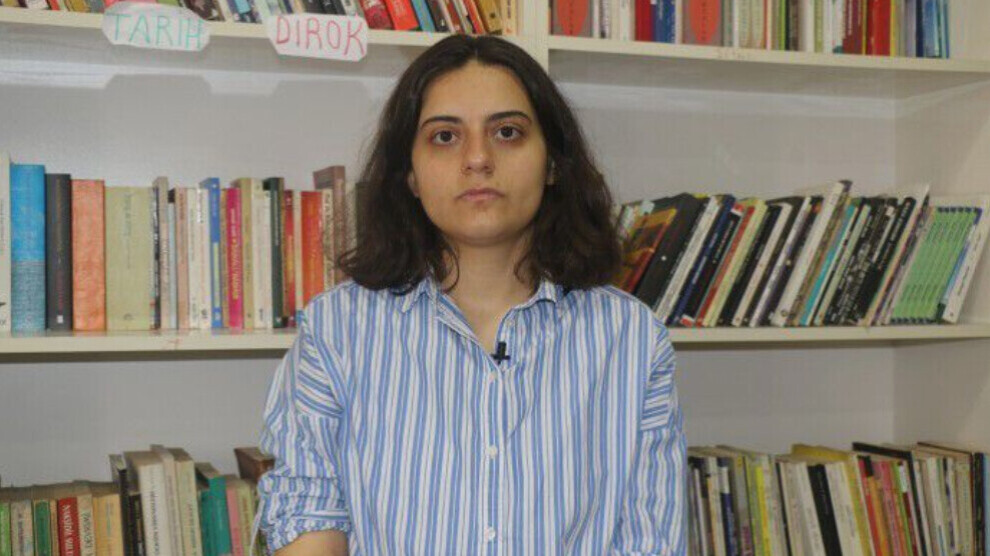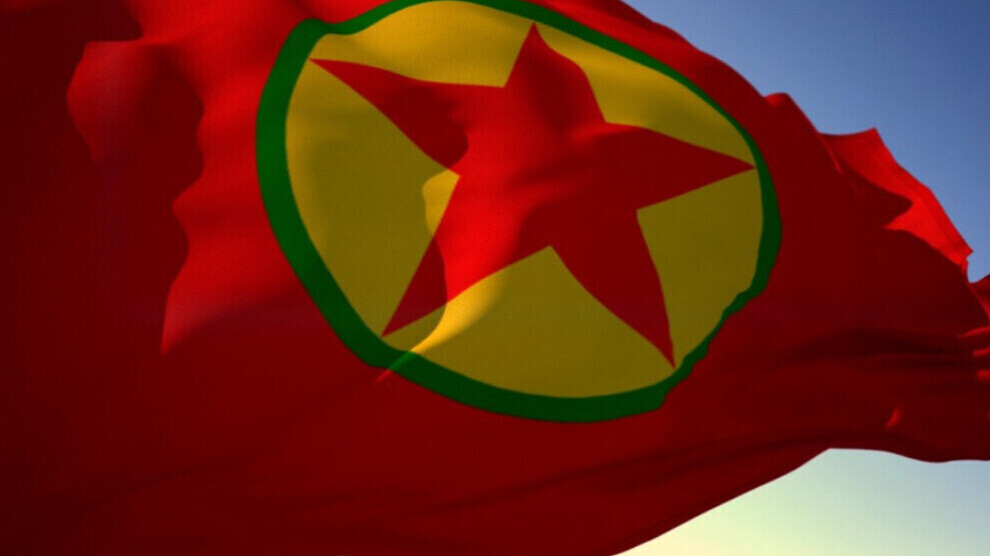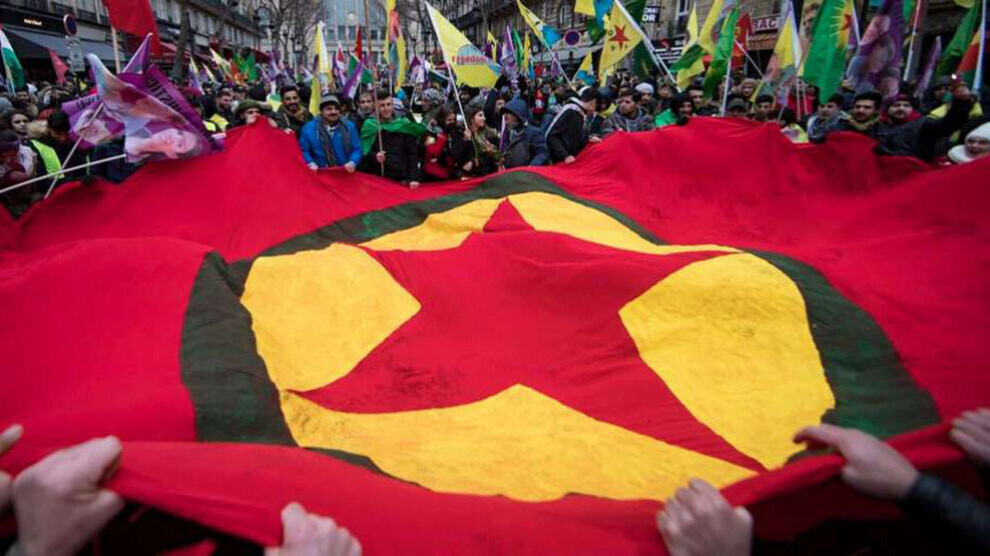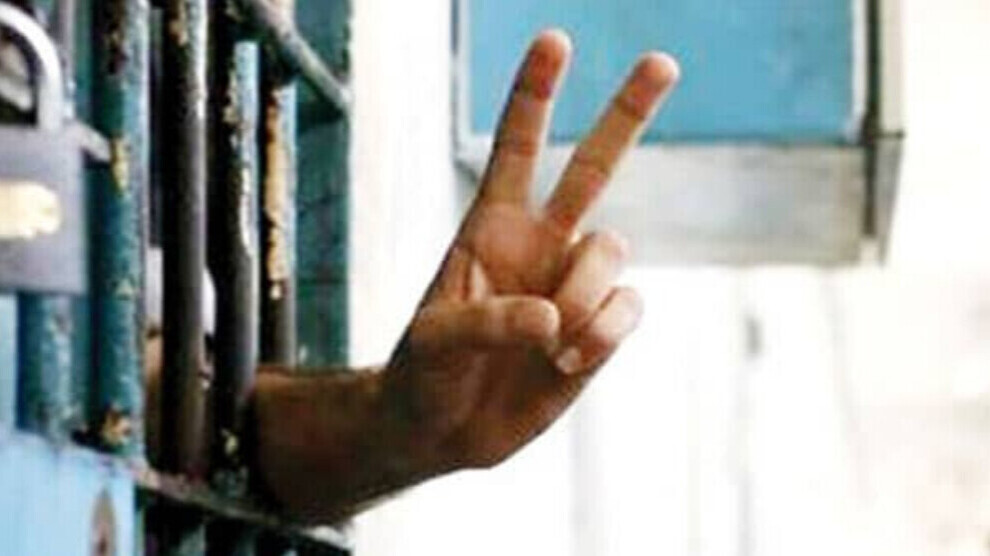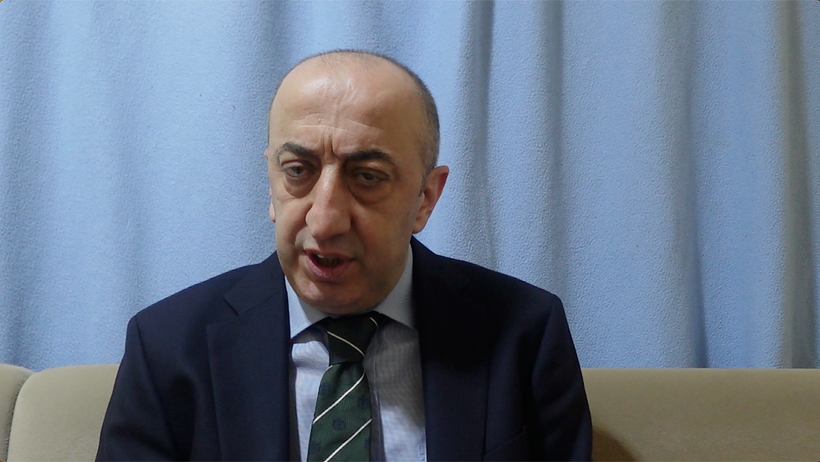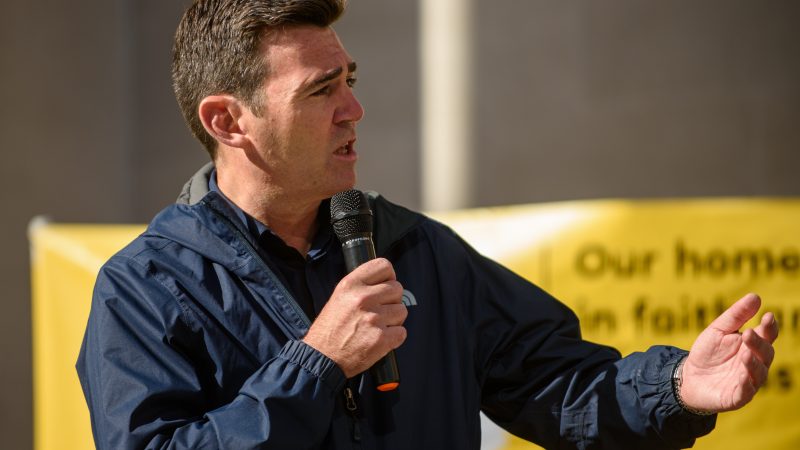Bayik: The real solution to problems in Middle East lies in policy of the democratic nation
Cemil Bayik said that "the real solution to the problems in the Middle East can be found in the policy of the democratic nation."
KCK Co-Chair Cemil Bayik answered questions on the Palestinian issue in an in-depth analysis in which he spoke about where this question came from, how it is handled by the different global and regional players today and what the interests of the peoples are.
Part one can be read here and part two can be read here
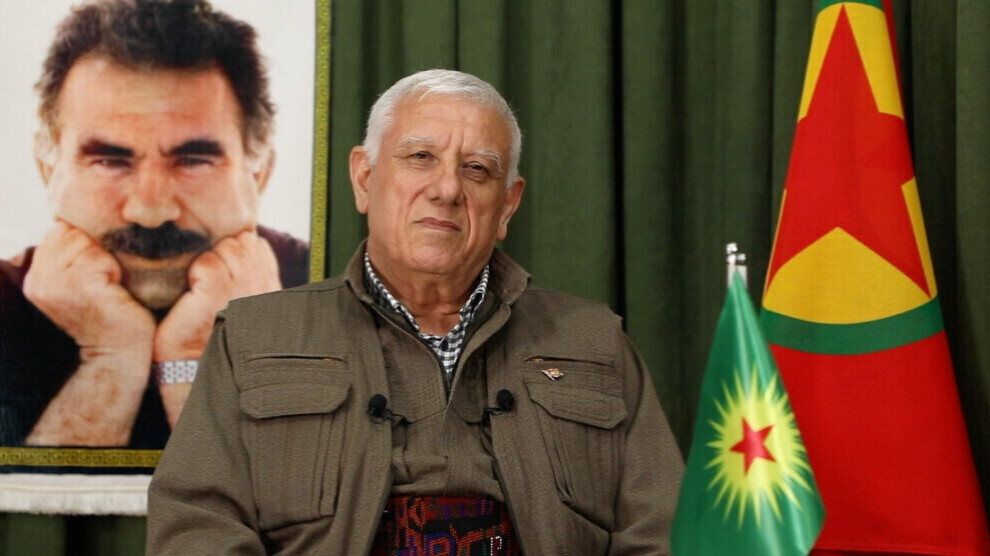
ANF
BEHDINAN
Friday, 24 Nov 2023
KCK IS THE PKK MILITARY ARM
It is widely considered that Iran and Turkey are de facto, if not officially, involved in this war. What is the approach of these two countries to the Palestinian issue, what kind of calculations do they have? How does the Palestinian issue affect the relations between these two countries? Will this affect their positions and policies in Syria and Iraq? How will this war affect the Kurdish question?
Iran and Turkey are two states trying to increase their influence in the region. Although their interests are different, they are united in this goal. This pushes them into competition and power struggle with each other and makes it necessary for them to keep an eye on each other. Ultimately, of course, one tries or wants to reduce the effectiveness of the other as much as possible and, if possible, to zero and bring it under its sovereignty. This is a fundamental characteristic of states. Often they seek to balance or dominate each other through relations developed with other powers. Swallowing each other up and destroying each other is rare. Even when it does happen, it can be the result of a policy and plan spread over time. However, along with the contradiction and struggle between them, there are also relations between them. One cannot ignore the other without establishing absolute superiority over the other. There is such a dialectic between Iran and Turkey. There is both a struggle between them to become a regional power and a relationship between them. Since one cannot establish absolute supremacy over the other, they pursue a balanced policy that watches out for each other.
Iran is not a power outside the system. It is part of the system of capitalist modernity and a party to the intra-system power struggle. It is therefore an active force in the Third World War. If it is categorized, in the US-Europe-Russia-China contradictions and conflicts, it is making policy by siding with the Russia-China front. It tries to neutralize or fend off the political and economic pressures of the US by siding with this front. In addition to this, there is also a front developed by Iran in the region, which is defined as the Shiite Crescent. There are forces in Iraq, Syria, Lebanon, Yemen and elsewhere that are part of this front. These forces are part of the rulers of these states. But these states are also in a state of disintegration. They are either in a state of civil war or they are in a state of disintegration and fragmentation. Because they are already in such a situation, Iran has brought them closer to itself or made those close to it influential in the state. Nevertheless, they are important powers. It is known that Iran makes politics in the region based on these forces and gains significant power from this. Iran is trying to balance the policies of the US and Israel against itself in the region through these forces. It is also getting certain results from this. However, despite this, Iran has not created an environment that has overcome the danger and made its politics accepted in the region. Just like the state of Israel, the Iranian state sees its existence in danger.
As in everything else, its approach to the Palestinian cause is within this framework. Iran is primarily concerned with preserving its existence as a state. Since it feels this concern very much, it is very careful about steps that would increase the danger. The Iranian state essentially wants to be accepted in the region with its current position and politics. It uses its relations and alliances in the region for this purpose. Its relations with Hamas are also within this framework. Since Hamas does not have a democratic essence, it needs forces like Iran and Turkey to fight against Israel, to be effective or to protect its existence. Although it has relations with other powers, it hopes to be effective mainly through the relations it develops with Turkey and Iran. This makes Hamas a part of regional interests, rivalries and power struggles. This, of course, harms the Palestinian cause, as it becomes part of regional contradictions, the democratic line of struggle regresses and moves away from a solution.
However, development can only be achieved by taking the democratic line of struggle as a basis and strengthening it. The Palestinian movement developed and strengthened after the Six Day War when it was realized that the Arab states did not have the power to find a solution. The struggle of the Palestinian people was strengthened by this. But now this independent and democratic stance has been lost. It has fallen behind even the old period. Of course, this does not mean that the Palestinian movement will not develop relations and receive support from states. The important thing is to take people-based resistance and struggle as a basis. Unless this is taken as a basis, no support received will serve the struggle. Moreover, the support of states depends on the policies they pursue. Iran, Turkey and all Arab states follow a policy based on their interests. None of these states can be strategic relations of the oppressed peoples. As can be seen, no state, including Iran, has taken any concrete steps. Iran operates the rings it has created outside according to its own policy. After Israel’s plan against Gaza became clear, it was expected by many circles that Iran would make a move by actively mobilizing Hezbollah and others and by stepping in itself, but this was not the case. This is because neither Iran nor anyone else is in a position to risk a move that would upset the balance. Undoubtedly, the problems in the Middle East are deep and have the potential to shake and change the balance. One of the factors that will lead to this is undoubtedly the Israeli-Palestinian conflict.
Turkey’s approach to developments in the region is purely utilitarian. Since the Turkish state system is completely detached from a democratic essence, in other words, since society has no influence on the state at all, it is able to act with a pragmatism that is far above the norm. What it calls wrong today it can call right tomorrow, and what it considers an enemy it can embrace tomorrow. Undoubtedly, the Turkish state is able to conduct such a policy by utilizing its geopolitical position. If this were not the case, it would not be able to pursue such a policy. The Turkish state is doing all this for the sake of advancing its policy of genocide of Kurds.
The main policy of the Turkish state is the policy of genocide of the Kurds. It conducts all its politics and relations accordingly. This is also its approach to the Palestinian cause. It wants to take advantage of the situation by pretending to defend the Palestinian cause. In reality, Turkey is concerned with developing the means to continue its policies of Kurdish genocide and thus increase its power in the region. This is why it looks tough in rhetoric but does not take any concrete steps. Because the Turkish state knows very well that it cannot continue its Kurdish genocide policies without the support of the US, Israel, Europe and NATO. Until today, it has been able to carry out its Kurdish genocide policies with the support it has received from these powers. Therefore, this support is important for the Turkish state.
Tayyip Erdoğan’s disturbances and objections are aimed at increasing this support. The AKP-MHP government has not really been interested in the Palestinian cause because it has received this support until today. Shortly before these war emerged, Tayyip Erdoğan had a meeting with Netanyahu in the USA. When the attacks on Gaza began, Tayyip Erdoğan said, “I was going to go to Israel, but now I have given up on this plan.” However, there are military, commercial and economic agreements worth billions of dollars between Turkey and Israel and these agreements continue as they are. It is known that even the bullets of the Israeli army are made of steel from Turkey. Israel’s army, planes and tanks are conducting drills at their centers in Konya, some of which are produced in Turkey. This is how much Turkey is involved in this war, it is a part of this war. They are trying to cover up the hypocrisy by hiding these from the public. By doing some very hypocritical things; for example, by not buying and consuming Israeli products in the parliament, the reaction against the state of Israel is supposedly developed. But military relations, energy and trade lines are fully functioning, millions of dollars continue to flow in and out on a daily basis. Indeed, this is the height of distortion and special warfare! Unfortunately, the pathetic situation in which the so-called opposition figures find themselves provides the ground for the government to play these games.
One of the reasons why the Turkish state has developed a certain discourse against Israel is the Iranian factor. As long as the Palestinian problem remains unresolved, the reactions against Israel in Arab and Islamic countries will not end. Iran takes advantage of the environment created by this reaction. It is unthinkable for Turkey, which has contradictions with Iran in the region and is engaged in a regional power struggle between them, to stay out of this and leave this area entirely to Iran. By developing a certain reaction and gathering some of the reaction around it, Turkey is preventing a complete shift of attention to Iran. Therefore, Turkey’s approach is highly political and this is not beyond the consent of the US. Another reason is domestic public opinion in Turkey. The AKP-MHP government rules the state and the country by establishing a tight manipulation and control over society. For this to happen, it has become very important to create and manage perceptions. Considering that local elections will soon be held, it is obvious that the AKP-MHP government will want to turn this situation into an opportunity. As a matter of fact, in the rally held in Istanbul for Palestine and Gaza, the masses were told about the enmity against Kurds and Rojava, and it was stated that new invasions would be carried out. In Turkey, the masses are being agitated by nationalism, religionism and Kurdish hostility. The Kurdish enmity is covered up with Islamic-religious discourses. In reality, Turkey has only one policy, and that is the Kurdish genocide policy. The Turkish state calculates and desires to become a power in the region through Kurdish enmity and genocide. It uses religion, Islam and nationalism for this purpose. It uses Hamas and the Palestinian cause for this purpose. Beyond this, the Turkish state has no interest and support for the Palestinian cause.
The anxious situation of the Turkish state is due to the fact that the balance is shifting to its detriment and that this will damage its policies of Kurdish genocide. All of Tayyip Erdoğan’s efforts are aimed at preventing this and, moreover, to get results in favor of his genocide policies. It is a fact that Turkey has always benefited from the increase in contradictions and conflicts in the world and the region. The benefit it has seen from the environment and balances created by the conflict situation has been decisive in carrying out its policies of Kurdish genocide. Without these factors, the Turkish state would not have been able to carry out its policies of Kurdish genocide based on its own power. Therefore, the Turkish state is not disturbed by the development of the conflict situation in the Middle East. On the contrary, it plans to create opportunities for itself from the conflict situation. By doing so, it plans to gain more support in the war against the Kurds and to carry out new invasions in Rojava and Syria.
While evaluating the wars and conflicts in the Middle East, Abdullah Öcalan states that religious ideologies and nationalism cannot create a solution, on the contrary, he stated “As long as the mentality of nation-statism, whether in the form of religious or secular nationalism, continues, it is inevitable that these societies will clash even more”. And also added, that this mentality is the root cause of wars and problems. As a solution modell, he puts forward the ‘democratic nation’. How can this solution be adapted to the Palestinian-Israeli conflict?
Historically, social problems have increased with the development of the statist system. As the state developed, humanity moved away from equality, freedom, fraternity and living together in peace. Instead exploitation and war have become dominant. This is a historical reality. The nation-state system is the system with the highest level of conflict, war and exploitation. The first and second world wars, and the hundreds of local and regional wars that preceded and followed these two great wars, were wars created and waged by nation-states. Conflict, war and exploitation in the last two centuries are hundreds of times greater than the negativity experienced in tens of thousands of years of human history before. This is not a matter of the sophistication of the tools of war, but of the mentality. The Middle East is one of the places where the nation-state has caused the most damage and has no solution power. The nation-state has increased the existing problems in the Middle East many times over. Now, all the problems in the Middle East take their source from the nation-state. The most fundamental obstacle to developments is the nation-state. Rêber Apo has dealt extensively with the character, mentality and consequences of both the state in general and the nation-state in particular within the historical social reality. The consequences of the nation-state, whether secular or religious, are the same. In both cases, it increases the problems and deepens the lack of solution.
One of the best examples of the secular and religious forms of the nation-state is Turkey. At its foundation, Turkey had a secular-nationalist form, where today it is based on religious-nationalism. In both cases, no real solution to Turkey’s problems has been found. Because it is not possible to solve problems of the society with the nation-state. The nation-state is essentially a doctrine of war and genocide. In addition to the war being waged against society, what goes on within the nation-state is more brutal, predatory, full of intrigue and conspiracies than what goes on in the kingdoms and dynasties before. It is utterly wrong to think that such a system will enlighten society and ensure progress. This is especially the view held by those in Turkey who are based on the idea of secularism. When religious nationalism comes to power and entrenches itself in the state, it is assumed that secular nationalism will lead a correct life and solve problems. However, the nation-state is an obstacle to enlightenment, democratization and a right and free life. Therefore, problems can be solved and progress can be achieved by overcoming both forms of nationalism.
The real solution to the problems in the Middle East can be found in the policy of the democratic nation. The democratic nation is a way of life in which the national reality is lived in its true dimensions, without the blinding and misleading aspects of nationalism. The democratic nation is the system in which peoples, societies, faith communities as well as women can live and express themselves in the most correct and free way. At the same time, the nation-state is the most crystallized form of power and authority, which is the product of the male-dominated mentality. Secular nationalism and religious nationalism are just different forms of the nation-state. In such a system, it is not possible for society, peoples and women to exist, live freely and express themselves. That it is not possible is already evident in practice.
Nationalism is at the root of the Arab-Jewish contradiction and problem. Therefore, overcoming this problem and living together and in peace can only be possible by overcoming nationalism, by overcoming both versions of the nation-state, religious and secular nationalism. This is the solution method we advocate. We do not think that the problems will be solved by establishing more nation-states. This is currently being presented as the most advanced solution to the Palestinian problem. Of course, the Israeli state does not accept this either. But a fundamental solution to the problem cannot be achieved by creating a state for the Palestinians. First of all, the nation-state mentality must be overcome. Unless this happens, contradiction and conflict will not end. A solution cannot be achieved by separating geographies, mountains, rivers and cities with the nation-state mentality. The solution for Jerusalem is to divide the city in two. Can such a thing happen? Many peoples, communities and beliefs live together in these ancient lands. In a geography with such diversity, it is not possible to solve problems through nationalism and nation-statism. This will only result in at each other’s throats. As a matter of fact, this is what has been happening for a hundred years. This can only be overcome with a democratic nation mentality and solution where all differences can live together and all national, cultural and religious communities can express themselves. The place where the democratic nation solution will find the most ground is the geography where Israel and the Palestinian people live.
How important is the solution of the Kurdish question and the Palestinian question for the solution of the problems in the Middle East, for the development of democratization and for the peoples to live in freedom, security and peace?
In fact, throughout the interview I tried to explain the importance of these two problems and the correct solution we envision. The order created by the forces of capitalist modernity in the Middle East has been to the detriment of the peoples. The denial and genocide of the Kurdish and Palestinian peoples is a result of this order. The problematic situation in the Middle East has been maintained by leaving these two problems unresolved and abandoning them to genocide. In this way, the nation-states in the Middle East have been pitted against each other and within themselves, controlled by the hegemonic powers and thus the Middle East has been made completely dependent. The peoples of the Middle East have suffered great pain and damage. The Kurdish people and the Palestinian people have suffered the most. The lack of a solution to these two problems has led not only to these peoples, but also to the development of the domination of the colonialist powers, the imperialists, over the region as we have mentioned, and to the damage of all peoples.
It can be said that if these two problems are solved, important developments will take place in the whole of the Middle East, conflict and war will end and real peace will become achievable. The Kurdish and Palestinian questions are the two biggest problems in the Middle East. But they are also the two biggest dynamics of democratization in the Middle East. Since the solution of these two problems requires a democratic mentality and approach, nationalism, religionism, nation-statism and all kinds of fanaticism, which are the sources of the problems in the Middle East, therefore need to be overcome. The fact that Iran, Iraq, Syria, Turkey and Israel have undergone some democratic transformations as a result of the permanent solution of these two problems is enough to understand the importance and magnitude of the developments. On the other hand, the grounds for all the designs, operations and conspiracies designed in the Middle East will be eliminated. Not only the region but also the world will be positively affected by the solution of the Kurdish and Palestinian problems.
